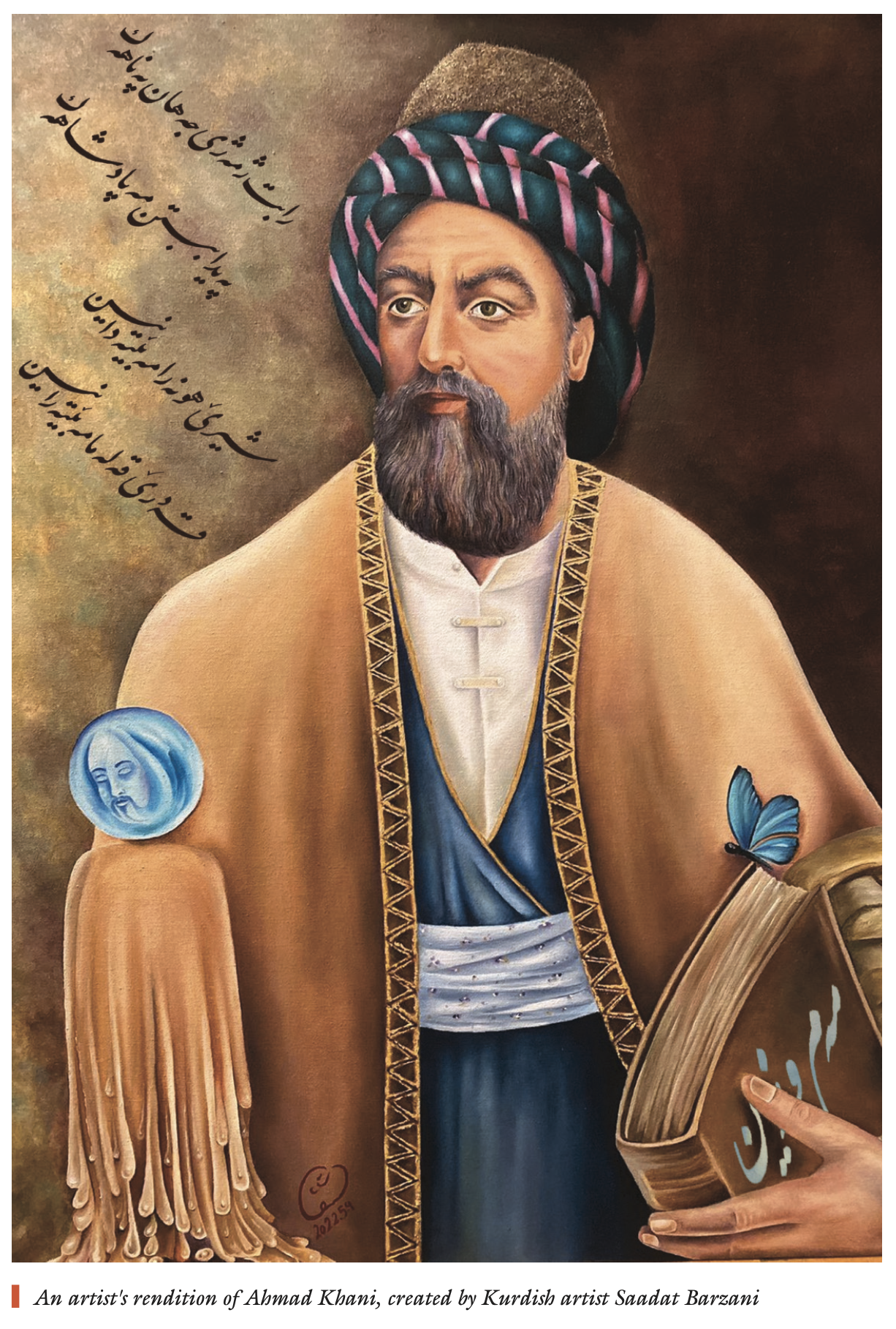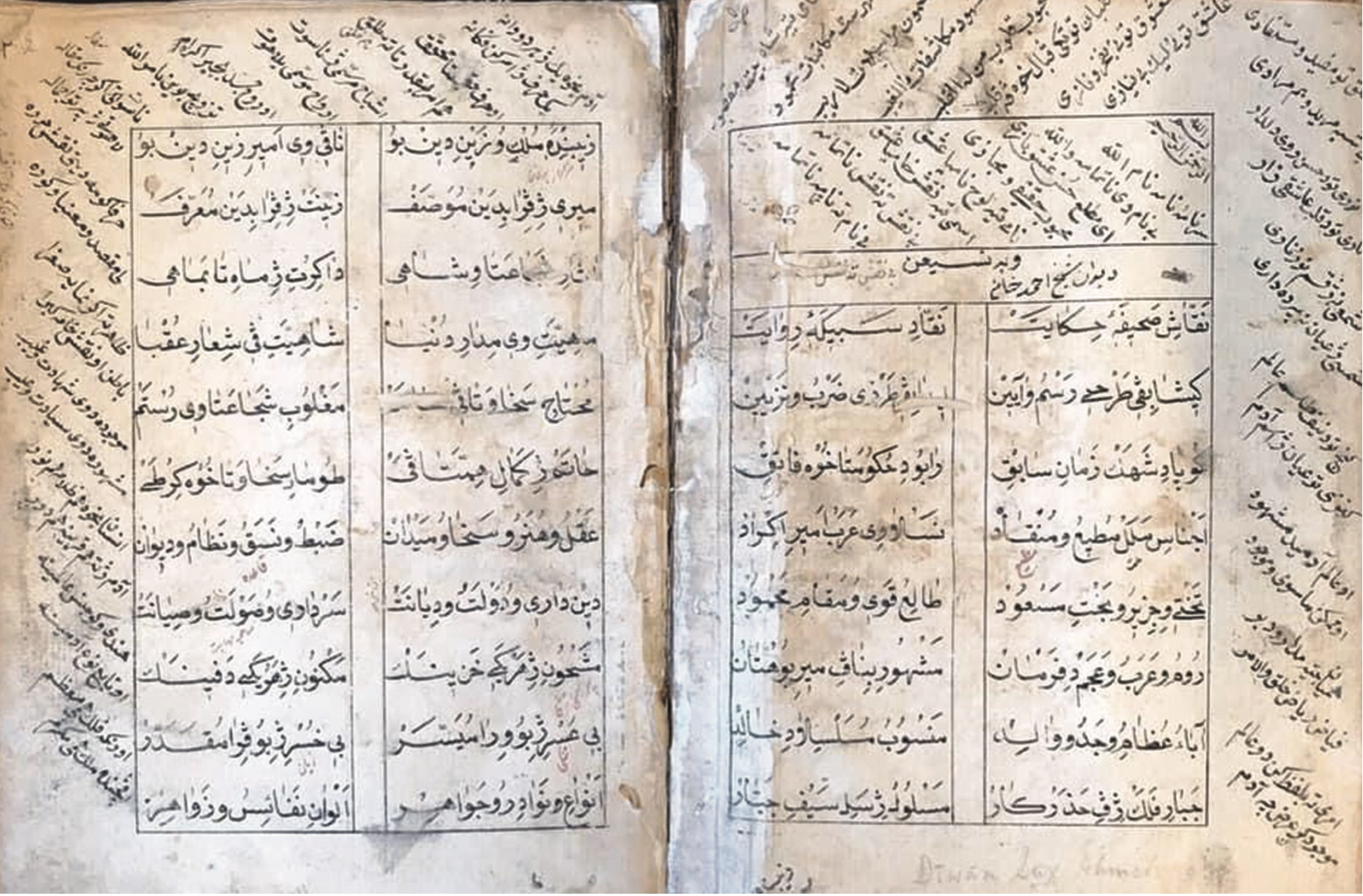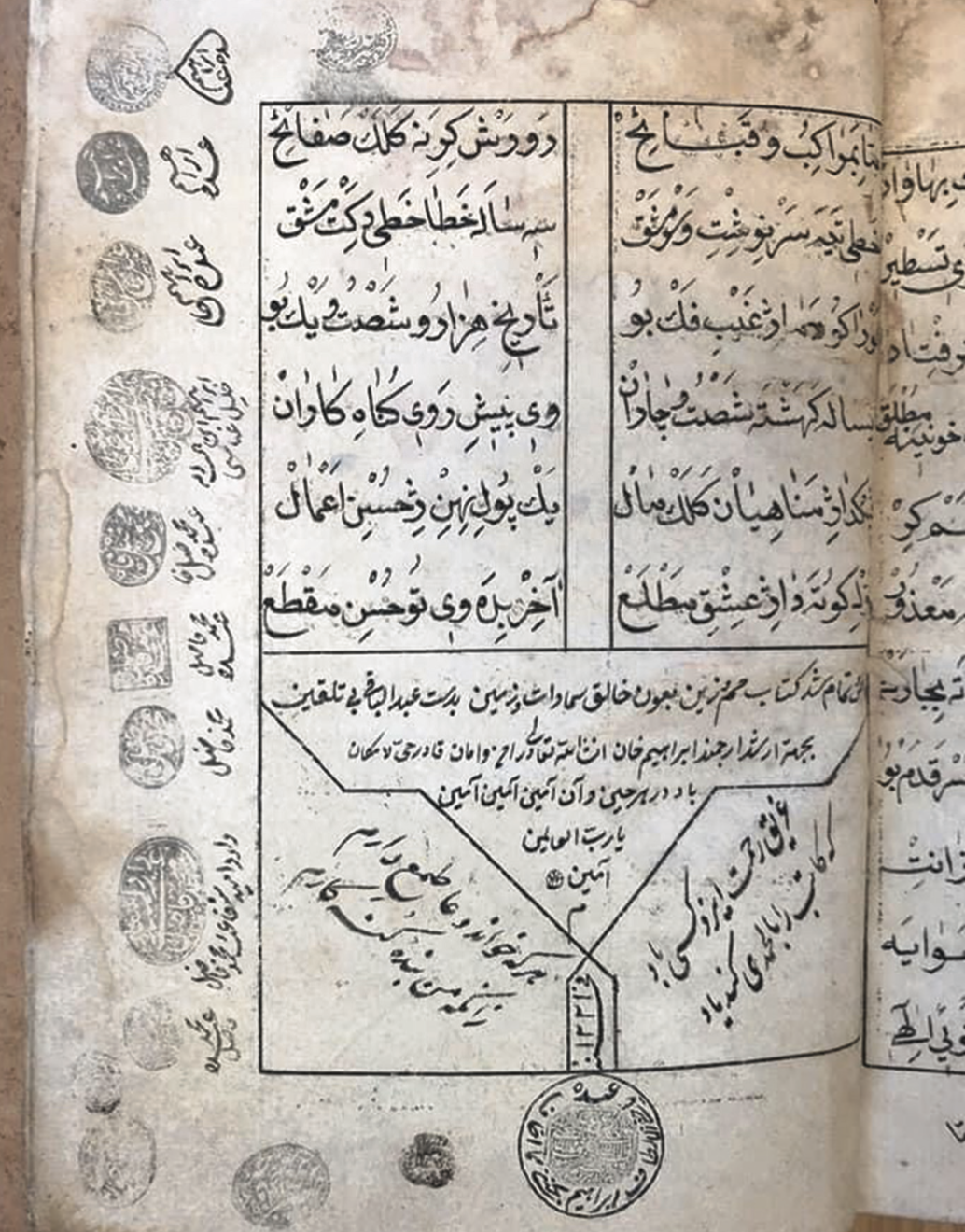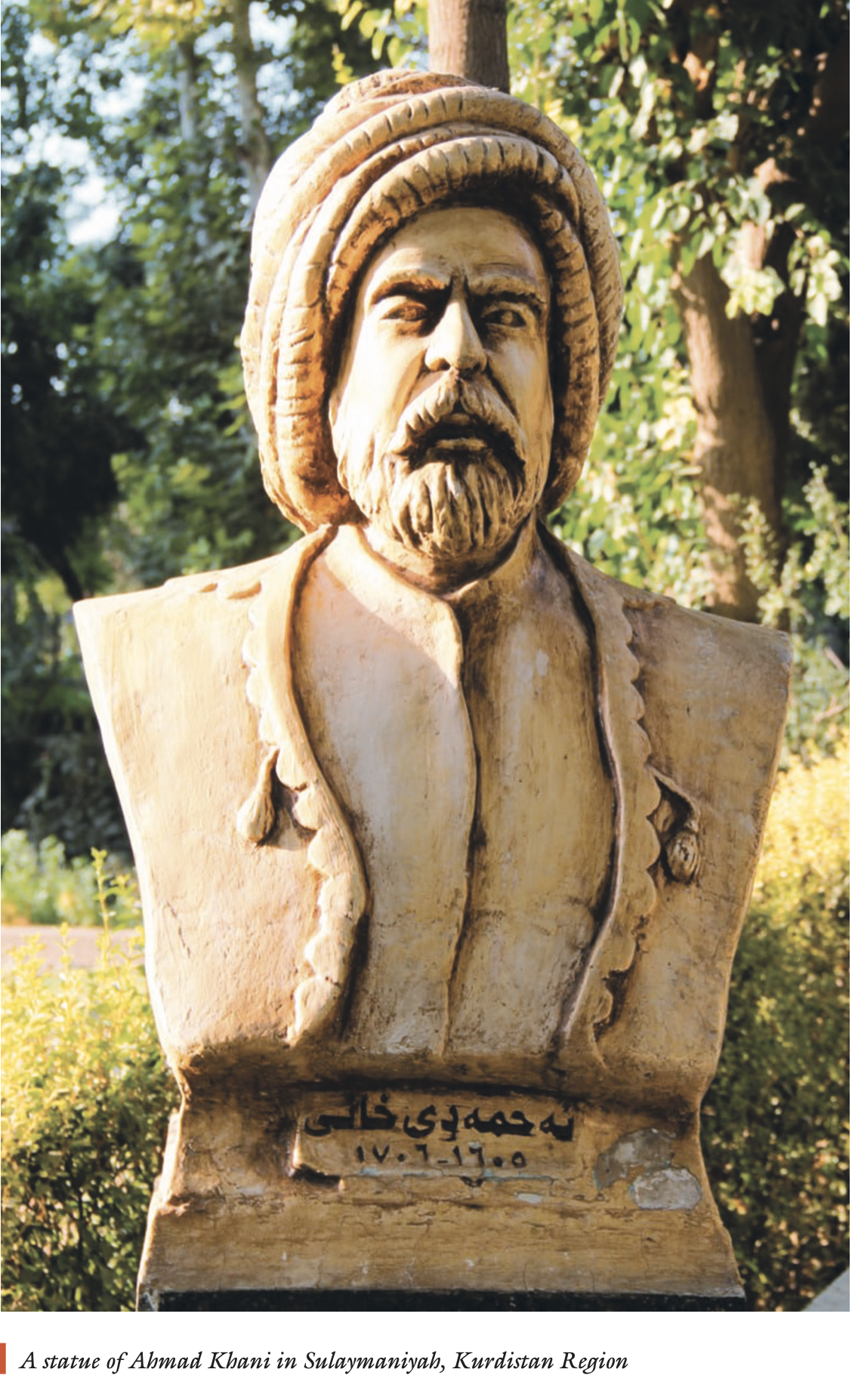Ahmad Khani, a prominent seventeenth-century Kurdish classic poet, intellectual, scholar, and mystic, was born and passed away in Dogubeyazit near the current border of Iran and Turkey.
Khani played an enlightening role and is considered the founder of Kurdish nationalism, as his poetry called for unity, freedom, independence, and the need for a leader around whom the Kurds could rally to save themselves from the oppression of the Safavid and Ottoman Empires.
One of Khani's most important works, Mem and Zin, is considered the national epic of Kurds and includes more than 2,600 verses of Arabic poetic meters and prosody modified by non-Arab poets. It not only tells the timeless love story between the young Mem, an employee of the Kurdish Emirate of Bohtan, and the Kurdish Princess Zin, sister of the ruler of the emirate, but also comprises other knowledge productions in philosophy, astronomy, and mysticism. In addition to being a crucial epic in the history of Kurdish literature and rightly considered the gospel of Kurdish nationalism, Khani compiled a small dictionary to teach Kurdish children the Arabic language. He also developed educational curricula to teach poetry prosody and the principles of the Islamic faith and has a beautiful collection of poetry that includes covers topics vary from philosophy and mysticism to ghazal, which is a form of amatory poem or ode.
Perhaps the call to write in the national language is one of the most important objectives that made Khani distinctive in the history of Kurdish literature and made him the spiritual father of writing in the mother tongue, especially through his wonderful introduction to Mem and Zin. Although Khani regards the languages of neighboring peoples as precious metals, like the gold and silver that people use and trade with, he also confirms that the Kurdish language can, at least, be copper and be valuable if used by a prince or ruler.

Sufi literature
Another pivotal topic that caught my attention in Khani’s poetry, which I have been devoting myself to studying and translating for many years, are the subjects of human tolerance, religion, and love as a supreme value.
Sufi literature (mystical literature) is generally about tolerance, with Sufi discourse based on values and principles that promote tolerance and harmony among mankind without discrimination. Sufis, according to Ibn Arabi, accept the coexistence of all the religions, and even consider them multiple forms of a single existence. The church is the house of God, like the mosque, synagogue, and even houses of pagan idols and Zoroastrian fire; according to the poets of Sufism, these are all indifferently considered houses of God. Based on this golden Sufi rule, which considers all religions to be divine and equal, Khani called for ending the torture of human beings including infidels with fire, as it is far from divine justice, and says:
Even if we were disbelievers and disobedient, we would all hope for your mercy and forgiveness, O Lord.
And there is no one among the disbelievers and disobedient who is not one of the manifestations of your attributes and qualities.
We have become disbelievers because Subduer is one of your names, and because you are forgiving, we have become disobedient and commit sins.
This idea (i.e., the fact that man's actions are manifestations of the eternal names of Allah) is what the Sufis, including Khani, started to reach – a state of acceptance of the other, regardless of their religion, sect, creed, or belief. Therefore, Allah cannot punish His servants for their actions as His mercy, compassion and forgiveness always precede his punishment, and thus, human beings should not fight each other because of religious differences.

A stream of tolerance
It is worth underscoring here that tolerance already exists among Kurdish societies and that Kurds do not accept religious extremism in any form or terrorism in the name of religion. Orientalists have referred to the tolerance in Kurdish society through the ways in which Kurdish women freely treat with foreigners without the burqa and women shake hands with a foreign man and sit in men’s meetings and gatherings and provide them with food in the absence of a man to do so.
It has been pointed out by the Kurdish writer and translator Mullah Mahmud Bayazidi in his nineteenth-century book Kurdish Customs and Traditions, which he wrote it at the request of the Russian consul in Erzurum August Zappa 1801-1894: “The Kurds never mistrust women and do not think to accuse their women of adultery and misdeeds, even if the women work, sit, talk, play and laugh with foreign men, or, if necessary, stay at the homes of strangers over the night.”
Therefore, with tolerance an inherent value of Kurdish society, we have seen it reflected in the works of Kurdish poets, foremost among them Ahmad Khani and his predecessor Malay Jaziri (1570-1640), who repeated the idea in many of his poems that love can be an alternative religion and that the Lalish Temple can represent the monastery, church, and other houses of worship.
The stream of tolerance brings together many poets in the East like the great Persian poets Jalal al-Din Rumi, Ibn Arabi, and Ibn al-Farid to our classical Kurdish poets who praised tolerance, the unity of the human element, and the need to spread divine love instead of doctrines that can fight and cause bloodshed due to fanaticism and extremism, which are often promulgated by clerics and religious leaders.
Sufism came as a peaceful alternative to the violent laws of sharia, and Sufis took up this human stream and gathered around it, seeing no alternative.

Tolerance for love
We have pointed out that the religious tolerance in Kurdish society led to the recognition of women's humanity and the acceptance of falling in love; hence, there have been many love stories and songs that honor and glorify love between a young man and a girl. There were widely known cases of two lovers fleeing from the strictures of family and resorting to a ruler, lord, or a senior cleric to protect love; these stories are still common in some Kurdish societies. In some cases, unfortunately, they ended with the killing of the girl to wash out the shame.
Khani talks about the love between a man and woman and sees it as a noble emotion that must be respected. We also note that he praises relationships before marriage and allowing lovers to practice kissing away from the curious.
In Mem and Zin, the lovers do not have legitimate ties except the bond of love; they are neither engaged nor a couple, but Khani allows them to have sexual practices such as kissing, lip-sucking, whispering, touching, and joining each other as they did in one of the orchards of Princess Zin's brother palace and then at another stage in one of the lobbies of the Royal Palace.

We see that Khani tolerates it to certain limits, which he called the limits of foreplay, and has defined a red line for which the area of the range cannot be crossed. This means that he would not have allowed the two lovers to have intercourse, despite the marriage project they had hoped to achieve. He only allows the upper half of the body in the case of love and does not accept to descend below that, which is to protect love from impurity (in his expression of course).
One may wonder here how seriously Khani legalizes these erotic practices among lovers, and whether what he wrote was out of a purely literary motive or was this his doctrine of love, which must be made manifest by some physical contact and pleasure?
I think Khani, who tolerated many matters, was so bold that he absolved Iblis for the crime of not prostrating to Adam, and prayed, as we have read, that God would not torture any human beings, even disbelievers, so long as they believe in what he wrote in this domain as well. In this light, there is no objection to the matter if love and the consent of both parties are the basis of a sexual practice.
Jan Dost is a prolific Kurdish poet, writer and translator. He has published several novels and translated a number of Kurdish literary masterpieces.

